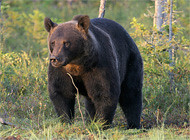 Bears have stopped hibernating in the Cantabrian Mountains of Spain, and instead, spend their winters wandering around, expending valuable energy by eating nuts, acorns, berries and chestnuts.
Bears have stopped hibernating in the Cantabrian Mountains of Spain, and instead, spend their winters wandering around, expending valuable energy by eating nuts, acorns, berries and chestnuts.
This is interesting because I thought that bear hibernation was a circadian (daylength) event rather than an environmentally-dependent event, but this shows that the trigger for hibernation is more complex that I supposed.
Bears have stopped hibernating in the mountains of northern Spain, scientists revealed yesterday, in what may be one of the strongest signals yet of how much climate change is affecting the natural world.
In a December in which bumblebees, butterflies and even swallows have been on the wing in Britain, European brown bears have been lumbering through the forests of Spain's Cantabrian mountains, when normally they would already be in their long, annual sleep.
Bears are supposed to slumber throughout the winter, slowing their body rhythms to a minimum and drawing on stored resources, because frozen weather makes food too scarce to find. The barely breathing creatures can lose up to 40 per cent of their body weight before warmer springtime weather rouses them back to life.
"I think it's an indication of what's to come. It shows climate change is not a natural phenomenon but something that is affecting not only on the weather, but impacting on the natural world in ways we're only now beginning to understand."
Cited story.
.

Dire news indeed. In here (Finland) we do occasionally have bears who have woken up in the middle of the winter, mainly because their hibernating nests get wet when it is warm enough for snow to melt. So they wander about looking for something to eat, but if there is enough snow they can't find anything.
This winter seems to be special in here too. We have still only a small dusting of snow and it looks like it might melt tomorrow, so this might be the first black Christmas I can remember (in about 20 years). Bears can't make decent nests, so I guess there are still fair amount of them wandering about. Good news is that there might be enough mushrooms etc. for them to eat so they wont be bothering people. Still, they give birth during hibernation, so I guess there might be only a few bear cubs come next summer :(
This just proves that bears are Liberals who are trying to push their anti-American values on the rest of us. How DARE they give more "evidence" to support global climate change.
No surprises there. Bears are tree-huggers. Proof.
Yes, it's more complicated. Photoperiod is an ultimate cue - it prepares them for hibernation in advance - putting on the fat etc. Temperature and food availability are proximal cues that determine if they actually will go to sleep once the time arrives.
Hi, I just read the same news for the siberian bears. They're not hibernating yet, and so far people has not been annoyed.
Here's the news:
http://www.alertnet.org/thenews/newsdesk/L15560536.htm
I'll check for italian bears too (yes, we have some bears in the mountain up north, and probably a remnant of a population in central Italy).
Marco
frozen weather makes food too scarce to find
And global warming makes it easier to find...God, how the bears must hate that.
even swallows have been on the wing in Britain
Who will stop this nightmare?
"It shows climate change is not a natural phenomenon but something that is affecting not only on the weather, but impacting on the natural world in ways we're only now beginning to understand."
Well, at least Bush's dastardly policies are being opposed by someone equally coherent and articulate.
Although the majority of species will suffer from global heating, a few are more likely to prosper.
Brown bears in particular lived in climates that did not require hibernation within historical times. This is indeed a sign that they will fare better than the Minnesota Moose or the Polar bears.